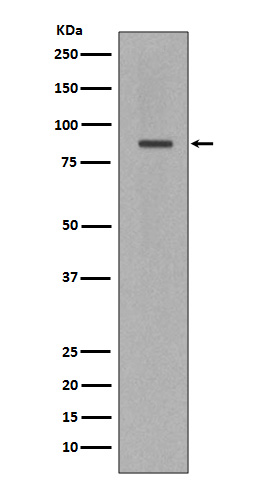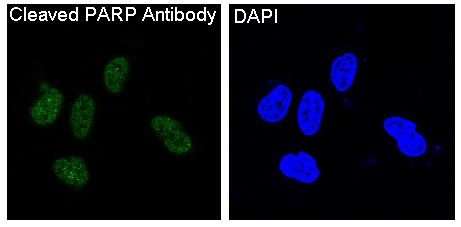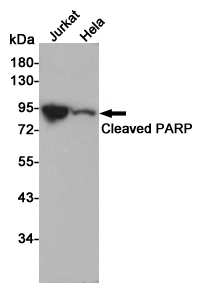-
Product Name
Anti-Cleaved PARP (Asp214) Rabbit antibody
- Documents
-
Description
Cleaved PARP (Asp214) Rabbit polyclonal antibody
-
Tested applications
WB, ICC/IF, IP, FC
-
Species reactivity
Human
-
Isotype
Rabbit IgG
-
Preparation
Antigen: A synthesized peptide derived from human Cleaved PARP
-
Clonality
Polyclonal
-
Formulation
Rabbit IgG in phosphate buffered saline , pH 7.4, 150mM NaCl, 0.02% sodium azide and 50% glycerol.
-
Storage instructions
Store at 4°C short term. Store at -20°C long term. Avoid freeze / thaw cycle.
-
Applications
WB: 1/500-1/2000
ICC/IF: 1/50-1/200
IP: 1/50
FC: 1/50
-
Validations

Western blot analysis of Cleaved PARP expression in Jurkat cell lysate.

Immunofluorescent analysis of HeLa cells, using Cleaved PARP Antibody .

Western blot analysis of Cleaved PARP expression in Jurkat and Hela cell lysates using Cleaved PARP antibody at 1/1000 dilution.Predicted band size:85KDa.Observed band size:89KDa.
-
Background
Swiss-Prot Acc.P09874.Involved in the base excision repair (BER) pathway, by catalyzing the poly(ADP-ribosyl)ation of a limited number of acceptor proteins involved in chromatin architecture and in DNA metabolism. This modification follows DNA damages and appears as an obligatory step in a detection/signaling pathway leading to the reparation of DNA strand breaks. Mediates the poly(ADP-ribosyl)ation of APLF and CHFR. Positively regulates the transcription of MTUS1 and negatively regulates the transcription of MTUS2/TIP150.
Related Products / Services
Please note: All products are "FOR RESEARCH USE ONLY AND ARE NOT INTENDED FOR DIAGNOSTIC OR THERAPEUTIC USE"
